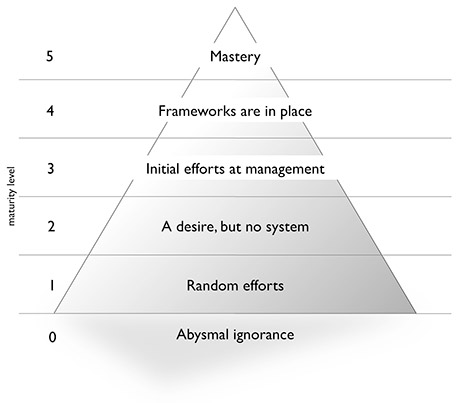By: Langdon Morris
The innovation system described in The Innovation Master Plan provides a comprehensive approach to a difficult, challenging, and significant problem for organizations, the problem of how to manage innovation in the face of excruciating change.
The innovation system described here is intended to provide a comprehensive approach to a difficult, challenging, and significant problem for organizations, the problem of how to manage innovation in the face of excruciating change. My goal has been to help you attain a higher level of mastery, and to guide you through the preparation of your own master plan, and thus to mastery of the innovation process.

The Pyramid of Mastery
Overall, what we’ve learned is that it works well to frame the issues and challenges of innovation management this way:
You know why innovation matters; it is a core element of your strategy, and it leads to results every organization must achieve on the way to its ultimate success in the market.
You know that innovation is a risky domain in which to invest, but also that those investments are mandatory. So what do you do? You manage the innovation portfolio, which enables you to effectively balance risk and reward.
It’s obvious that the quality of your approach to innovation matters a great deal. The difference between knowing how and a broken process is so huge that it cannot be overlooked.
It’s also entirely clear that the innovation capacities of your people are essential to achieving your innovation goals. For who will do it if you do not? Your organizational culture must therefore define norms that encourage and enhance innovation as long term creators of value.
And it’s clear that the right infrastructure can support a tremendous improvement in the quality of the process, as well as the satisfaction of the participants, and the value of the results. Where you innovate is defined by the essential infrastructure.
These five themes, organized and managed in harmony, constitute an innovation system. And while there will certainly be improvements to make in the coming years, we’ve been at this long enough to feel confident that this is an effective platform, and it’s working well for many organizations.
Relentlessly changing conditions mean that the business world evolves rapidly, and innovation is therefore not optional. New products and services coming into the market affect the fate of all participants in the market ecosystem, and while any innovations applied throughout your organization may be important, innovations linked with your strategic intent will likely be life-sustaining.
Nevertheless, recognizing that change in the marketplace is real and inescapable, and that adapting to its tacitly-driven, turbulent evolution through innovation is a necessity, this is an issue that confronts all executives. For although we may remember periods that seemed stable, they are in fact long gone and never to return.
As markets continue to evolve and competition becomes ever more demanding, engaging in the search for innovation therefore becomes not just an interesting possibility, but a requirement. To survive, all business leaders must develop a comprehensive approach to innovation, and I hope that the framework offered through this concept of the Master Plan can help them and their organizations to be more effective; that it can help you and your organization to be more effective.
In the end, when we look at the business world it’s clear that the story of change is still the important story to tell, and the process of leading an organization in the face of change remains the critical skill. Innovation will inevitably play a leading role in the unfolding marketplace drama, and the capacity of your firm to innovate will eventually go a long way toward deciding its fate.
The Greeks thought that each individual’s fate was given, predetermined at birth, and that it could not be avoided. Achilles, they told us, was inescapably and tragically destined to die from the inevitable wound to his heel.
But we know differently. There is no predestiny when it comes to innovation; what matters is what you can accomplish, not the gifts that the gods gave to you, nor the ones they took away.
Yes, your firm can become a brilliant innovator, and alter the course of the market. To do so will require skill, as well as luck, but mostly skill. So when chemist Louis Pasteur said that “luck favors the prepared mind,” he was giving us guidance. So was golfer Gary Player when he said, “the more I practice, the luckier I get.”
Will you wait for luck to arrive, or will you prepare your mind and your organization, practice diligently, and create your own future? I know, it’s really not a choice when I frame the alternatives that way. Preparation or luck? No, if innovation is in your future, and I believe it has to be, then it’s up to you and your colleagues to make it so. And I hope that your own version of the innovation master plan will significantly help you to attain your goals.
About the author:
 Langdon Morris is a co-founder of InnovationLabs LLC, one of the world’s leading innovation consultancies.
Langdon Morris is a co-founder of InnovationLabs LLC, one of the world’s leading innovation consultancies.
Langdon is also a Contributing Editor and Writer of Innovation Management, Associate Editor of the International Journal of Innovation Science, a member of the Scientific Committee of Business Digest, Paris, and Editor of the Aerospace Technology Working Group Innovation Series.
He is author, co-author, or editor of eight books on innovation and strategy, and a frequent speaker at innovation conferences worldwide. He has lectured at universities on 4 continents.
The Innovation Master Plan: The CEO’s Guide to Innovation is now available at Amazon.com.
